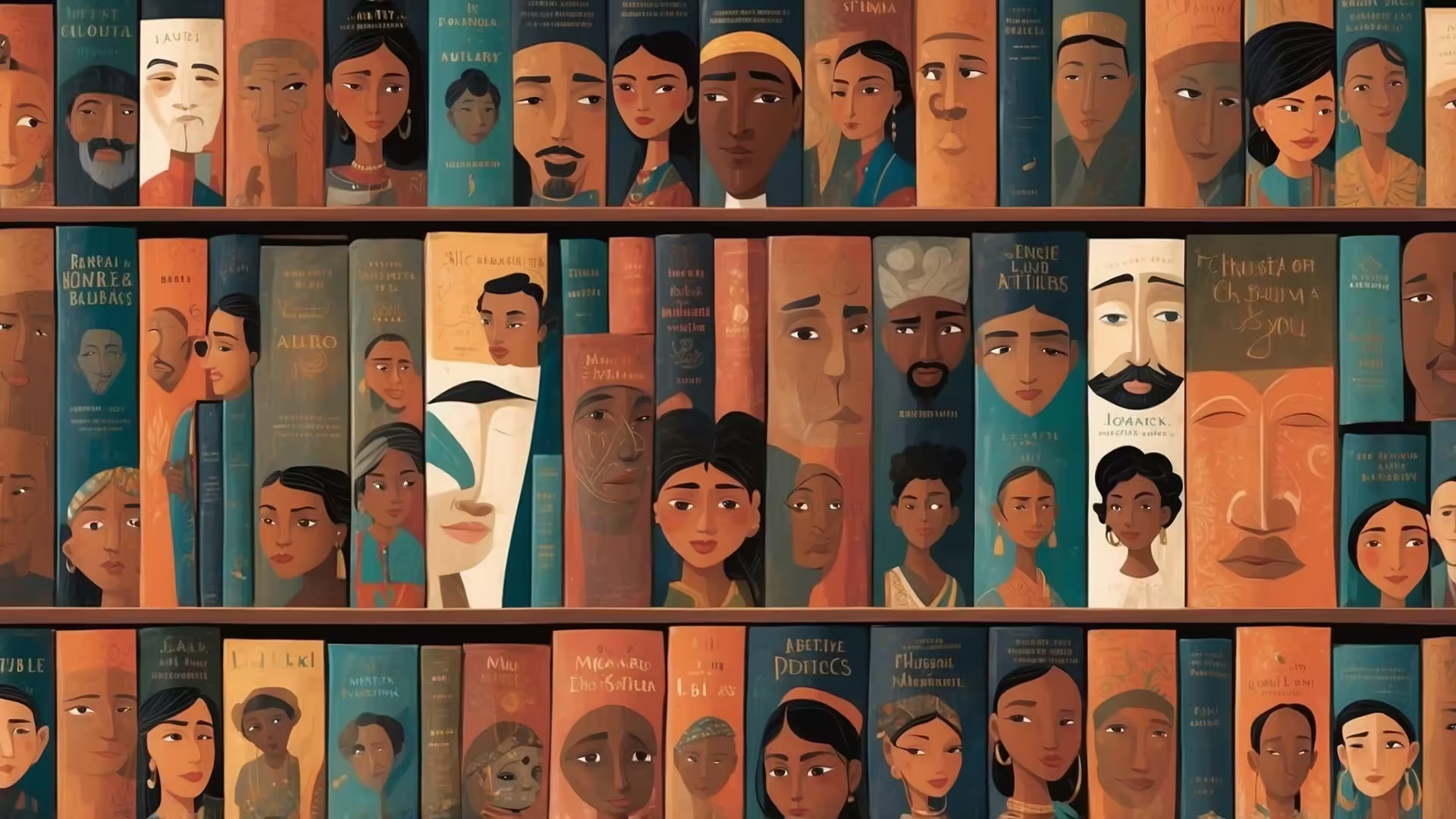- The Gist
- The Influence of Postcolonial Literature on Cultural Identity
- What is Postcolonial Literature?
- Reclaiming Identity and Voice
- Highlighting the Impact of Language
- Addressing the Complexities of Cultural Hybridity
- Fostering Empathy and Understanding Through Diverse Narratives
- Postcolonial Literature as a Tool for Social Change
- The Lasting Influence of Postcolonial Literature
- Let’s Talk
- Let’s Learn Vocabulary in Context
The Gist
Postcolonial literature is more than just stories; it’s a powerful way to reclaim identity, voice, and history. By exploring themes of cultural identity, resistance, and belonging, postcolonial authors have provided insight into the complex identities shaped by colonization. This literature offers readers a chance to see the world through new perspectives, understand different histories, and appreciate the strength of cultural resilience. That’s just the gist of what this post is about. If you want to dig deeper into the topic, some discussions about it, and learn some key vocabulary from its context, read the post.
The Influence of Postcolonial Literature on Cultural Identity
Postcolonial literature has played an integral role in shaping and reclaiming cultural identity, especially for those affected by the legacies of colonialism. Written by authors from formerly colonized countries, postcolonial literature confronts the impacts of colonial history, exploring how colonization influenced culture, language, and identity. In this journey of self-discovery and reclamation, postcolonial literature has become a voice for cultural expression, resistance, and resilience, allowing people to reconnect with and reframe their cultural identities.
What is Postcolonial Literature?
Postcolonial literature refers to works written by authors from regions that experienced colonization, often from Africa, Asia, the Caribbean, and Latin America. This genre addresses the struggles of these societies, shedding light on the historical, political, and social impacts of colonial rule. Authors in this field often confront themes like loss of identity, cultural dislocation, and the clash between traditional values and imposed foreign beliefs.
The goal of postcolonial literature is often to bring awareness to the complexities of life after colonialism, exposing the lasting effects of colonization on cultural identity. By doing so, these authors give a voice to those whose stories and histories were marginalized or erased, reclaiming the narrative and reasserting cultural pride.
Reclaiming Identity and Voice
One of the most significant impacts of postcolonial literature is its role in helping people reclaim their identity and voice. For many colonized societies, colonial rule meant the suppression of local languages, customs, and beliefs. Colonizers often imposed their own language, education systems, and cultural norms, leaving local populations feeling alienated from their heritage. Postcolonial authors use literature to rediscover and celebrate their roots, reintroducing cultural narratives that were overshadowed or erased.
For instance, Chinua Achebe’s Things Fall Apart is a well-known work that explores the clash between traditional African culture and European colonization. Through the story of Okonkwo and his village, Achebe presents a vivid picture of pre-colonial life, challenging stereotypes and showing readers the richness of Igbo culture. This act of reclaiming stories serves to rebuild cultural identity, challenging colonial perspectives and bringing authentic voices to the forefront.
Highlighting the Impact of Language
Language plays a crucial role in postcolonial literature, as it was often a tool of control used by colonizers to suppress indigenous voices. Many postcolonial authors write in the language of their colonizers, such as English or French, not as an acceptance of colonialism but as a way to “write back” to the empire. By using the colonizer’s language, these authors reach a global audience while embedding local dialects, cultural references, and oral traditions into their work, subverting colonial narratives and reclaiming the language.
Authors like Ngũgĩ wa Thiong’o from Kenya have gone even further by choosing to write exclusively in their native languages. Ngũgĩ wa Thiong’o, for example, started writing in Gikuyu to resist the imposition of colonial language and reclaim his cultural identity. By doing so, he emphasizes the importance of preserving indigenous languages and cultures, reminding readers that language is a vital part of identity.
Addressing the Complexities of Cultural Hybridity
Postcolonial literature also explores the complexities of cultural hybridity, which arises when multiple cultures mix due to colonization. Hybridity can lead to identity conflicts, as people struggle to reconcile their traditional values with the influence of colonial culture. Many postcolonial works portray characters caught between two worlds, often questioning their sense of belonging.
This theme is evident in works like The Inheritance of Loss by Kiran Desai, which addresses the struggles of identity and cultural disconnection among individuals affected by globalization and colonial history. By depicting these challenges, postcolonial literature encourages readers to think about the fluid nature of identity and the resilience of individuals in the face of cultural fragmentation.
Fostering Empathy and Understanding Through Diverse Narratives
Postcolonial literature offers readers around the world a chance to learn about the experiences and histories of those affected by colonialism. By telling stories from unique cultural perspectives, postcolonial authors foster empathy, understanding, and appreciation for cultural diversity. Readers are introduced to different worldviews, learning to see the world through the eyes of those whose lives were shaped by colonial rule.
This exposure to diverse narratives helps bridge cultural divides, offering a window into the struggles, triumphs, and unique identities of others. Works like Half of a Yellow Sun by Chimamanda Ngozi Adichie, which tells the story of the Nigerian Civil War, highlight the resilience of people facing challenges rooted in colonial history. Through such narratives, readers gain insight into how these experiences shape cultural identity and contribute to a shared human experience.
Postcolonial Literature as a Tool for Social Change
Beyond cultural identity, postcolonial literature also serves as a powerful tool for social change. By addressing issues of oppression, inequality, and justice, these works inspire conversations around human rights, liberation, and equality. Authors like Arundhati Roy and Salman Rushdie use their writing to critique political systems, colonial mindsets, and the lingering effects of imperialism. Their works call for a more inclusive world that values diversity, justice, and the autonomy of all cultures.
As readers engage with postcolonial literature, they are encouraged to think critically about social and cultural issues, questioning colonial narratives and advocating for change. This reflective process leads to greater awareness and understanding of the need to respect and protect diverse cultures, supporting efforts toward a more equitable global society.
The Lasting Influence of Postcolonial Literature
Postcolonial literature has left an indelible mark on cultural identity, giving voice to stories and experiences that were once silenced. By exploring themes of identity, language, hybridity, and social justice, postcolonial authors continue to empower individuals to reconnect with their heritage, challenge stereotypes, and celebrate cultural diversity. This literature reminds us of the importance of honoring and preserving cultural identity, not just for those affected by colonial history, but for all who value the richness of a diverse and inclusive world. Through postcolonial literature, we are reminded that our identities are shaped by our histories and that embracing this complexity can lead to a more compassionate and understanding global community.
Let’s Talk
Let’s dive a little deeper into postcolonial literature and its impact on cultural identity. There’s something truly fascinating about how these stories reshape the way we think about our own identities and, honestly, how they open up a whole new perspective on history. Have you ever read a book and felt like you were seeing a side of history that had been completely hidden from view? That’s one of the beautiful aspects of postcolonial literature—it doesn’t just fill in the gaps; it flips the script, making us question the stories we thought we knew.
One thing that stands out in postcolonial literature is how it deals with identity struggles. Think about it: for many people in formerly colonized countries, identity is woven from a mix of their native traditions and the influence of the colonizers. It’s this intricate blend of cultures that leads to a sense of hybridity, which can be both enriching and confusing. Now, here’s a question to chew on—do you think that this cultural mixing strengthens identity or blurs it? Maybe it depends on how people choose to engage with it, finding ways to celebrate both their heritage and the newer influences.
Another layer is language. The way postcolonial authors use language—sometimes writing in the language of the colonizer but weaving in local dialects and customs—creates a powerful statement. It’s like they’re saying, “We can use your language, but on our terms.” Isn’t that an intriguing way to reclaim a piece of identity? I wonder, have you ever felt like language shaped how you see yourself or others? It’s amazing how words can carry so much history and weight, especially when they’ve been used in ways that both divide and unify.
And here’s the thing: the impact of postcolonial literature isn’t limited to academics or people from colonized countries. It influences everyone who reads it by fostering empathy and awareness. Imagine learning about someone else’s experiences that are so vastly different from your own—it can really change how we see not just other cultures, but also our role in the global community. What if more of us read these stories, and we all became a little more conscious of how history shapes people today? It makes you think about how literature, in general, could be a pathway to a more connected and compassionate world.
So, here’s a little challenge: next time you pick up a novel, look for something from a postcolonial author. You might be surprised at how much it reshapes your view of the world, one page at a time.
Let’s Learn Vocabulary in Context
Let’s break down some key terms from this topic, starting with postcolonial. This word is about the period after colonization ended, but it also refers to ideas, issues, and literature that explore the impacts of colonial rule. So, if someone talks about a “postcolonial perspective,” they mean looking at things through the lens of a society dealing with its colonial past.
Colonization is when one country takes control over another, often exploiting its resources and people. For example, you might say, “Colonization left lasting impacts on many cultures around the world.”
Next, we have cultural identity. This term refers to how people identify with their culture, traditions, and heritage. If someone says, “My cultural identity is rooted in my family’s traditions,” they mean that their sense of who they are comes from their cultural background.
Then there’s hybridity. Hybridity in postcolonial literature describes the mix of different cultures, usually between the colonizer and the colonized. You could think of hybridity as cultural blending, like when a person’s identity includes both their traditional heritage and foreign influences.
Language in this context is a big deal. It’s more than just words; it’s a tool of power and expression. Postcolonial writers often use the colonizer’s language to express their own culture’s stories, almost like reclaiming a piece of their history.
Empathy means the ability to understand and share the feelings of another person. When we read stories from different cultures, we’re practicing empathy by trying to see life from someone else’s viewpoint.
Perspective is a way of looking at something. In postcolonial literature, we get perspectives from people who were often left out of the dominant narratives. If you say, “The book gave me a new perspective on history,” it means it helped you see things differently.
Identity is all about who someone is, shaped by personal, cultural, and social factors. Postcolonial literature often explores the identity conflicts that people face when different cultures clash.
Narrative refers to the story or account of events. When postcolonial writers reclaim their narrative, they are telling their story from their own viewpoint, instead of how the colonizers would tell it.
Social change happens when a society makes improvements in areas like equality, justice, or human rights. Postcolonial literature can inspire social change by highlighting injustices and encouraging readers to think differently.
Resilience is the ability to bounce back from challenges. Many postcolonial stories show resilience as people hold onto their culture and identity despite the impacts of colonization.
So, here’s a question: how do you think understanding these terms could help us in everyday life, not just in reading literature? And which one of these words do you think has the most personal significance? It’s incredible how words can open our minds to new ways of seeing the world.










0 Comments